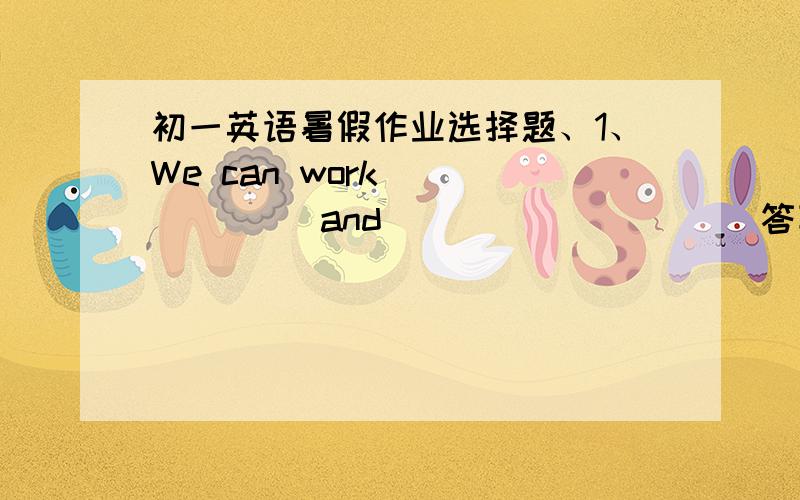初一英语暑假作业选择题、1、We can work ( ) and ( ) 答案:A A.evening;weekend B.evenings;weekends C.evenings;weekend D.evening;weekends(为什么是A不是B?)2、Do you want to work with ( ) young
来源:学生作业帮助网 编辑:作业帮 时间:2024/11/17 02:50:28

初一英语暑假作业选择题、1、We can work ( ) and ( ) 答案:A A.evening;weekend B.evenings;weekends C.evenings;weekend D.evening;weekends(为什么是A不是B?)2、Do you want to work with ( ) young
初一英语暑假作业选择题、
1、We can work ( ) and ( ) 答案:A
A.evening;weekend B.evenings;weekends C.evenings;weekend D.evening;weekends
(为什么是A不是B?)
2、Do you want to work with ( ) young people? 答案:A
A.other B.others C.the other D.the others
(麻烦把这四个词的用法简单解释一下、易懂就好、最好有例句、谢了)
3、There are a lot of ( ) the fruit tree. 答案:A
A.leaves on B.leaves in C.leafs on D.leafs in
(树叶长在树上不是用in吗?为什么选A不选B啊、)
请回答的简单、全面一些、谢谢、
初一英语暑假作业选择题、1、We can work ( ) and ( ) 答案:A A.evening;weekend B.evenings;weekends C.evenings;weekend D.evening;weekends(为什么是A不是B?)2、Do you want to work with ( ) young
other意思是其他的,是泛指其他的另一个,比如,这双鞋太贵了,可以换另一双吗?而others也是指其他的,比如,这几本书我看不懂,可以给我换另外几本书吗?有一定的范围,是一个群体.the other意思同other,但是是特指的另一个.the others是一群里面特指的,比如,有的学生在操场上跳绳,是特指在在操场上跳绳的学生,而在操场上跳绳的学生不止一个,所以应该用the others.
这样你该懂了吧!
长在树上用on
1.evening weekend没有复数形式
2.one… the other 只有两个
some… the others 有三个以上
one… another,another…
some… others,others…
others = other people/things
the others = the rest...
全部展开
1.evening weekend没有复数形式
2.one… the other 只有两个
some… the others 有三个以上
one… another,another…
some… others,others…
others = other people/things
the others = the rest 剩余的全部
1) 泛指另一个用another。
2) 一定范围内两人(物),一个用one,另一个用the other。
3) 一定范围内三者,一个用one,另一个用one (another),第三个可用the other,a third。
4) 一定范围内,除去一部分人/物,剩余的全部用the others。
5) 泛指别的人或物时,用others当在一定范围内,除去一部分后,剩余部分但不是全部时,也用others。
3.on、in、at:
on,at,in这三个常用介词都可以表示时间和地点,但具体用法不同,多数学生对它们混淆不清。现在只要记住了口诀,就可避免at,on,in的种种误用。
1. on,in,at表示时间
on“在具体某一天”①
“当某时”,动名词, arrival,death前;early,late位句先②,用in一般“上”“下”“晚”;on用于天,in用于月、季、年③;限定三时in要变。 ④at是个时间点,“工作”“时刻”与“圣诞”⑤。at noon(night),in the day,习惯用语记心间。
注:①on表示在具体某一天及具体某一天的上午、下午和晚上。
例 On mother's Day, we should send flowers to our mother. 母亲节,我们应该送花给我们的母亲。
On my arrival home,I found he had gone already.当我到家时,我发现他已经走了。
② 当early,late用于句首修饰介词短语时,尽管表示具体某一天的上午、下午、晚上,都要用in,泛指一般的上、下午,晚上也用in 。
例 Early in the morning of National Day,I got up to catch the first bus to the zoo. 国庆节一清早,我便起床去赶到动物园的第一班公共汽车。
My father begins work at 8:00 in the morning and stops work at 4:00 in the afternoon. 我父亲上午8点上班,下午4点下班。
③于将来时态表示“过一段时间后” 及表示“在……期间” 和“在某个季节,某年、某月” 都用in。
例 I hear he’ll be back in a month.我听说他将于一个月后回来。
In the course of the last lesson in French,little Franz was listening to the master very attentively.在那最后一堂法语课中,小弗朗兹非常用心地听着老师讲。
Xiao Ming was born in December of 2004. 小明生于2004年12月。
④当 morning,afternoon,evening有前位定语或后置定语限定时,就不用in而用on。
例 on a hot (summer) noon 在一个炎热(夏天)的中午
on Monday morning 在星期一上午
on the morning of March 8th在3月8日上午
⑤ 表示某时某刻及在work,Christmas前用at。
例 We get up at eight o’clock. 我们8点起床。
My father are busily at work all day. 我父亲整天忙于工作。
In western countries children get present from their parents at Christmas. 在西方国家,孩子们在圣诞节得到父亲给的礼物。
实际上是有关介词in和on的区别。介词in和on在表示方位的时候,在用法上有如下区别:
in表示在……中,在……内,例如:
in the village(在村里)
in the street(在街上)
in the fields(在田里)
in the woods(在树林里)
in the wall(在墙里面,例如在墙上打个钉)
on 表示在一个平面上,例如:
on the table(在桌上)
on the lake(在湖面上)
on the wall(在墙上,例如在墙的平面上挂幅画)
再比较:
We swim in the river.(我们在河里游泳)
We have a house on the river.(我们有座房子在河面上)
【in】我是“大姐”,因为我后面所接的都是较长时间。具体用法有:
1. 表示在较长的时间里(如周/月份/季节/年份/世纪等)。如:in a week; in May; in spring/summer/autumn/winter; in 2008; in the 1990’s等。
2. 表示在上午、下午或晚上。如:in the morning/afternoon/evening。
3. in the daytime(在白天) 属于固定搭配,指从日出到日落这一段时间,反义词组是in the night。
4. “in + 一段时间”表示“多久以后/以内”,常与将来时连用。如:in half an hour; in ten minutes; in a few days等。
【on】我是 “二姐”,我后面所接的时间多与日期有关。具体用法有:
1. 表示在具体的某一天(如日期、生日、节日或星期几)。如:on May 4th, 1919; on Monday; on Teachers’ Day; on my birthday; on that day等。
2. 表示某一天的上午、下午或晚上。如:on the morning of July 2; on Sunday afternoon; on a cold winter evening等。
【at】我是“小妹”,因为接在我后面的时间最短。具体用法有:
1. 表示在某一具体时刻,即几点几分。如:at six o’clock; at half past nine; at a quarter to six; at this time等。
2. 表示在某一短暂的时间。如:at noon; at this moment; at the end of a year; at the start of the concert等。
收起